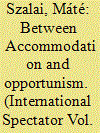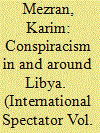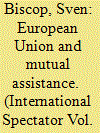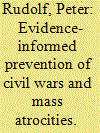|
|
|
Sort Order |
|
|
|
Items / Page
|
|
|
|
|
|
|
| Srl | Item |
| 1 |
ID:
152972


|
|
|
|
|
| Summary/Abstract |
Smaller members of the Gulf Cooperation Council defied theoretical and practical expectations as they were able to enlarge their international influence during the years of the Arab Spring. They adopted markedly different foreign policy strategies, which can be seen as stances lying between accommodation and opportunism, depending on the extent to which they respected the security concerns of their geopolitical patron, Saudi Arabia. The mainstream schools of IR theory – neorealism, neoliberalism and constructivism – offer different explanations for these phenomena. Although none of the three schools can provide a completely exhaustive explanation, neoliberalism seems to offer the most comprehensive framework for analysis.
|
|
|
|
|
|
|
|
|
|
|
|
|
|
|
|
| 2 |
ID:
146687


|
|
|
|
|
| Summary/Abstract |
The idea that there is one cohesive Islamist movement with a clearly defined plan to conquer power in Libya is a deeply flawed argument. It is one that, among other causes, is at the basis of the current divisions in the country and its civil strife. The Islamist movement in Libya, on the contrary, is a highly heterogeneous reality. Understanding this divisiveness is fundamental to the elaboration of a strategy for reunification and the establishment of law and order. Such a strategy should be based on the principle of incorporating those Islamists who accept the democratic process and isolating the more extremist ones.
|
|
|
|
|
|
|
|
|
|
|
|
|
|
|
|
| 3 |
ID:
146686


|
|
|
|
|
| Summary/Abstract |
The post-intervention situation in Libya poses foreign and security policy challenges for Egypt. Egypt’s definition of the Libyan problem centres on two fundamental aspects: it is depicted as the consequence of an unfinished R2P military intervention, and perceived as part of a regional war against Islamist terrorism. All practical steps being taken by the authorities in Cairo are based on this dual framing. The implications of its positioning are, firstly, a securitised approach to foreign policy, including limited military interference and proxy support and, secondly, the emergence of a partisan position. To date, the impact of Egypt’s foreign policy line in the Libyan theatre has been limited and hence its viability risks being thrown into question.
|
|
|
|
|
|
|
|
|
|
|
|
|
|
|
|
| 4 |
ID:
146689


|
|
|
|
|
| Summary/Abstract |
The first activation of the European Union’s “Mutual Assistance Clause”, following the 13 November 2015 terrorist attacks in Paris, demonstrated that this article can be used very flexibly, not just to help defend French territory but also its expeditionary operations. But if flexibility is an asset, improvisation is not. In order to maximise the potential of the clause, the role of the EU institutions needs to be clarified, in addition to that of the member states, and new capacities must be created at the EU level, notably in intelligence and planning.
|
|
|
|
|
|
|
|
|
|
|
|
|
|
|
|
| 5 |
ID:
146684


|
|
|
|
|
| Summary/Abstract |
The prevention discourse in all its forms has tended to ignore or at least downplay the epistemic problems with prevention. Forecasting political violence is not as easy as the debate on early warning often assumes. Effectively forestalling political violence and mass atrocities is much more difficult than the often used rhetoric of a ‘tool box’ implies, which creates the impression that one knows what works. An evidence-informed prevention policy needs to be aware of the limits of our knowledge, but at the same time knowledgeable of what social science research can provide – even if the results are provisional, often controversial and fraught with methodological problems.
|
|
|
|
|
|
|
|
|
|
|
|
|
|
|
|
| 6 |
ID:
146680


|
|
|
|
|
| Summary/Abstract |
Public debates on R2P one-sidedly focus on its forcible aspects. They should, however, also focus on R2P’s non-coercive aspects, which include the legal obligations to cooperate and to pursue peaceful conflict resolution, notably the obligation to undertake meaningful attempts at negotiation before coercive means are taken into consideration. After the Arab Spring erupted in Libya and Syria, other countries did not exhaust reasonable efforts to deal and negotiate with the incumbent powers, and to assist and encourage them to meet their obligations under R2P, even though negotiations are part and parcel of the R2P framework and constitute the very first step to be taken whenever a state seems to ignore its obligations under that framework.
|
|
|
|
|
|
|
|
|
|
|
|
|
|
|
|
| 7 |
ID:
146677


|
|
|
|
|
| Summary/Abstract |
Is R2P the most effective tool the international community has to prevent genocide, or the newest neo-imperial norm perpetuated by the most powerful states? In a dramatic performance of the key debates within R2P, each of these views is presented before Aristotlean and Tocquevillean insights are drawn upon to find a middle ground rooted in citizen resistance against mass atrocity crimes. R2P can both become a more effective tool of prevention and gain needed political legitimacy by drawing on the rich historical tradition of citizen resistance to empower local actors defying regimes engaged in mass atrocity crimes.
|
|
|
|
|
|
|
|
|
|
|
|
|
|
|
|
| 8 |
ID:
146681


|
|
|
|
|
| Summary/Abstract |
Russia’s predominantly suspicious and even negative attitudes toward R2P are closely related to its traditional attachment to the notion of sovereignty, but its reluctance to ‘bless’ the use of force with R2P also serves as a pretext to cover various instrumental goals. Russia’s more assertive foreign policy has exacerbated this trend. Disagreements stem from differences between Russia and the West both in their conceptual approaches to security and in their assessments of specific cases. In particular, Russia has an existential concern over possible application of R2P by extra-regional actors in its immediate post-Soviet vicinity. However, in the conflicts around South Ossetia (2008) and Crimea / Southeastern Ukraine (2014-), there was a noticeable trend to refocus R2P-related arguments in support of Russia’s own actions. By and large, R2P continues to be perceived as a Western attempt to establish certain rules of behaviour which require caution and prudence. Nevertheless, more positive attitudes do not seem impossible. To play a prominent role in the evolving international system, Russia will have to make the R2P segment of its foreign policy more salient and overcome the lag in promoting this concept as a working tool indispensable for cooperative and responsible leadership.
|
|
|
|
|
|
|
|
|
|
|
|
|
|
|
|
| 9 |
ID:
146673


|
|
|
|
|
| Summary/Abstract |
Far from having faded away, ten years after its formal adoption, the responsibility to protect (R2P), is arguably more relevant than ever. In the current overall context of protection crises, heightened in severity by the emergence of violent extremists, R2P has changed the way in which the international community characterises situations that involve protection failures, and has raised expectations about what should occur when atrocity crimes have been committed or are imminent. UN member states now agree that prevention is at the core of R2P, that international action should employ the full range of diplomatic, political and humanitarian measures, and that military force should only be considered as a measure of last resort. While there is continued contestation about particular aspects of R2P – as there is over much older normative advancements, such as human rights – R2P has helped to forge political consensus and build new institutional capacity to prevent and respond to atrocity crimes.
|
|
|
|
|
|
|
|
|
|
|
|
|
|
|
|
| 10 |
ID:
146679


|
|
|
|
|
| Summary/Abstract |
Ten years after its formal adoption, the R2P doctrine remains an incomplete project in a world of continuing conflicts now aggravated by the existential threat of global terrorism. The debate on the permissibility of military action to stop mass atrocities when authorisation to use force is not forthcoming from the Security Council has produced only a plurality of conflicting theories but hardly any progress at the normative level. A two-pronged approach could be used to consolidate R2P as a doctrine fully integrated into the corpus of international law. The first prong requires the revamping of the largely neglected Article 48 of the ILC Draft on State Responsibility; the second involves using R2P as a platform to initiate a reform of customary international law to make it more consistent with elementary principles of justice and universal human rights.
|
|
|
|
|
|
|
|
|
|
|
|
|
|
|
|
| 11 |
ID:
146683


|
|
|
|
|
| Summary/Abstract |
Intentional destruction of cultural heritage is a well-known phenomenon which has been particularly exacerbated in recent times. Its common denominator is represented by the intent to persecute the communities for which that heritage represents an essential element of their cultural identity and distinctiveness. In legal terms, it produces different implications, to the point that – depending on the circumstances in which it is perpetrated – it may be qualified as a war crime, crime against humanity, violation of internationally recognised human rights, or evidence of the existence of the intent to commit genocide. Since the whole international community is seriously affected by the destruction of cultural heritage, it is indispensable that the doctrine of responsibility to protect (R2P) be put into practice seriously and effectively with the purpose of protecting humanity against the irreplaceable loss of its heritage.
|
|
|
|
|
|
|
|
|
|
|
|
|
|
|
|
|
|
|
|
|